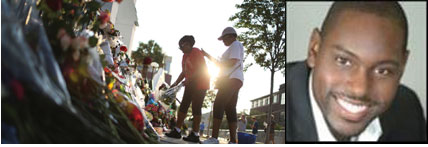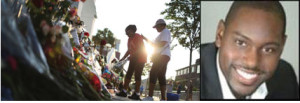
 Is anywhere safe? Finding psychological safety in a dangerous world
Is anywhere safe? Finding psychological safety in a dangerous world
Dr. Isaiah B. Pickens, Ph.D., A licensed clinical psychologist in New York City and founder of iOpening Enterprises. Joe Raedle via Getty Images
It was almost as perplexing as the event that caused it — family member after family member forgiving the killer of nine church members in Charleston, S.C. while pleading for justice. A stunned nation watched as the tectonic plates undergirding racial relations in the United States shifted, highlighting the enduring impact of prejudice on the safety of American citizens. The physical endangerment that intense hostility toward a group can produce is particularly unsettling when you consider the breadth of damage it can have on how the targeted group thinks about their safety. With each family member facing the prospect of shattered beliefs about personal safety, one clear question emerged: Why choose forgiveness and justice to rebuild a sense of security?
The unknown can be scary — especially after a traumatic event that invades a space once considered a safe haven from the world’s threats. At the heart of post-traumatic stress disorder (PTSD) and other forms of extreme anxiety is a pervasive sense that the threat of that traumatic event has not passed and there is a need to protect oneself from the future unknown, even if there is no threat present to support that belief. Trauma, like the event in Charleston, can truly get into an individual’s head by restructuring how the brain appraises situations and compelling the body to remain on high alert for safety threats.
Despite the amazing capabilities of our brains and bodies, constantly remaining on alert depletes many of our mental resources for navigating other life responsibilities and compromises one of our most valuable tools for maintaining sanity: psychological safety. Believing that we have the resources to manage life stressors or can connect with someone who will help reflects one of our innate needs to form secure connections that foster a sense of stability and safety that supersede life stressors. The unknown that follows trauma can strip that sense of psychological safety we spend our entire lives building.
In the aftermath of 9/11, it was clear that many people at the towers and around the country were struggling to feel safe, regardless of reassurances from leaders. To address this challenge, mental health professionals began employing a technique called psychological first aid. Like CPR, psychological first aid was intended to help the person move beyond the crisis by stabilizing their mental state and restoring a sense of psychological safety. A key contributor to the success of this technique was its ability to help the person to see the threat accurately (it’s real but not overwhelming) and create a concrete plan for how to get through the immediate after-math of the crisis. For the families of Charleston victims, forgiveness was that plan.
The burden of hating some-one and giving permission for them to remain in one’s personal mental space can be men-tally destabilizing and recent research has shown that forgiveness provides a pathway for restoring a sense of wholeness that the traumatic event tries to steal. The forgiveness given in the courtroom was likely more about healing for the families than blind willingness to accept the act of a killer. Despite the circumstances that continued to surround these families, forgiveness and faith provided a secure connection that made the unknown future more manageable.
The tricky part about the unknown future is that real danger still abounds. Inspiration for much of the killer’s actions in Charleston hid in plain sight: a website, an organization supporting white-separatism and a flag signifying much more than southern pride to many. These muses for the killer represented both explicit and implicit forms of bias that feed hostile beliefs, which can lead to tragedies such as Charleston. Fortunately, Charleston is the exception because most forms of bias are implicit, or outside our awareness, and rear themselves in more subtle ways. That guy (insert ethnic name) just didn’t feel right for the job. You talk ‘white’ (read: articulate and grammatically correct).
Here’s the truth: We all show bias and good people with the best intentions can still hurt others with their biases without knowing it. Combating such a covert foe requires effortful awareness about all of our susceptibility and an active pursuit of correcting intentional and unintentional consequences of our biases. It is this ideal of justice that the United States was founded to create and strives to achieve regardless of threats to our physical and psychological safety that remain.


Be the first to comment